Text

👀👀👀 Check out our EWOC volunteer group pics from Labor Notes 2024!
4 notes
·
View notes
Text

Get your copy today! 📕
3 notes
·
View notes
Text
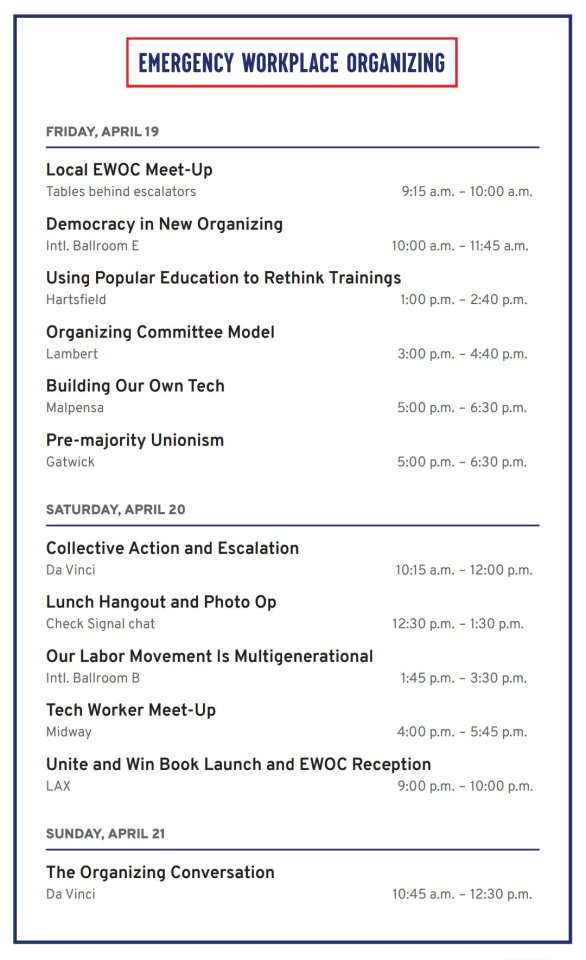
Labor Notes 2024 is on, and we're here!
Stop by our table and say hi.
Be sure to also check out our schedule for the conference.👇
3 notes
·
View notes
Text

Join the Emergency Workplace Organizing Committee for a discussion of
Climate Justice at Work
Tuesday, April 9 at 8 p.m. ET / 5 p.m. PT
We’ll be joined by workers in union and non-union workplaces who’ve been fighting climate injustice at work. Farmworkers, teachers, solar construction workers, and Starbucks baristas — all building their worker power to demand better working conditions in a changing climate and a sustainable future for all.
Co-sponsored by Labor Network for Sustainability and Climate and Community Project.
Register
Panelists include:
Alfredo J.: farmworker and member of Familias Unidas Por La Justicia. Alfredo and Familias Unidas are leading the fight to protect farmworkers, and all workers who labor outside, from deadly heat and other climate hazards. These workers feed our families, working long hours to ensure food gets to our kitchen tables. Their courageous organizing won permanent, year-round expanded heat protection regulations for outdoor workers in all of Washington State.
Lauren B.: teacher and member of the Chicago Teachers Union. Lauren is a high school social studies teacher and Chair of the Chicago Teachers Union Climate Justice Committee. She and her coworkers are fighting alongside local environmental justice leaders for green, healthy, sustainable community schools.
Joseph S.: solar energy construction worker and member of the Green Workers Alliance. Joseph and over 1,400 non-union utility scale solar and wind energy construction workers across the country are leading the fight against job insecurity, low wages, lack of benefits and poor safety conditions for this essential workforce. They are demanding better for green energy workers who do the critical work to ensure a zero-emissions future and a living planet for us all.
Mad A.: Starbucks barista, member of SBWU. Starbucks workers at Mad's store in Houston took action on the shop floor around health and safety concerns over working with a broken AC system in the Texas heat. Organizing around this issue galvanized the store and helped them develop a culture of strong union involvement after a period of low participation.
Mijin Cha: moderator. J. Mijin Cha is an assistant professor of environmental studies at the University of California, Santa Cruz, a fellow at Cornell’s Climate Jobs Institute, and board member for both the Greenpeace Fund and the Center on Race, Poverty, and the Environment. Dr. Cha’s work looks at the intersection of climate, labor, and inequality.
Register
4 notes
·
View notes
Text
San Antonio Workplace Organizing Committee to support local union efforts
By Josh Peck

The San Antonio chapter of the Democratic Socialists of America (DSA) voted last week to establish the San Antonio Workplace Organizing Committee (SAWOC), which supporters said will serve as a local hub to help workers form unions in their workplaces.
SAWOC is a local chapter of the Emergency Workplace Organizing Committee (EWOC), a volunteer-based organization which was established in 2020. It aims to help workers around the country form unions because the possibility for in-person organizing was diminished by the COVID-19 pandemic. It was created through a collaboration between the national DSA and the United Electrical, Radio, and Machine Workers of America.
Alex Birnel, a former co-chair of San Antonio DSA and one of the authors of the SAWOC resolution, said the EWOC model provides more capacity to organize workers that many large unions don’t currently have.
“EWOC was a way of bridging the gap between appetite for unions and the inability of some of the bigger unions to bring on new drives, organizing in a traditional fashion with traditional tactics and traditional strategy,” he said.
A UT Austin Texas Politics Poll from December 2023 found that 64% of Texans believe unions are good for workers, but only 3.2% of workers in the private sector and 19.3% of workers in the public sector were in unions last year.

Despite the large coffers of major unions, according to labor union researcher and activist Chris Bohner, union organizing staff have declined over the last few decades, and only a handful of unions — like the United Auto Workers — are aggressively organizing new workers.
Birnel explained why San Antonio DSA decided to create their own local version of EWOC.
“The cool thing about localizing the EWOC model is it allows you to work with your local union community and build more relationships with union organizers — people that know how to form unions, how to help workers do everything from map their workplace to prepare for a contact campaign — to connect those folks with the existing labor community and all the organs of that community,” he said.
Alejandra Lopez is another co-author of the SAWOC resolution, the first vice president in the San Antonio AFL-CIO Central Labor Council, and the president of San Antonio Alliance, the union representing San Antonio Independent School District educators and support workers.
Lopez said the San Antonio AFL-CIO passed a resolution last week that supported the SAWOC and appointed a liaison to maintain communication between SAWOC and the San Antonio AFL-CIO.
“We want to ensure that there’s a strong relationship between the people who are being plugged in through the EWOC program and the organized, established labor locals here in the city, because we’re only going to build worker power by bringing all of those different groups of people together,” Lopez said.

She said the ultimate dynamic between SAWOC and the San Antonio AFL-CIO will become clearer as communication between the two groups continues, but that step one is education about what SAWOC can be.
“We want to ensure that the Central Labor Council knows what the project is, what the positive impacts of this project will be, and how necessary this project is to continuing to build worker power in the city,” she said.
One possible route for the partnership is financial support for SAWOC from the local union federation to professionalize the organizing efforts.
“EWOC is, in its inception [and] almost on purpose, a volunteer-led effort,” Birnel said. “But with more resources, you can put together locally branded materials that have the endorsements of all the local unions on it. And this is for the formation of a common identity here locally. … It can also allow for things like scalability, where if you need to rent rooms at the public library to do trainings — things like this — it can make doing in person EWOC trainings a possibility.”
He added that SAWOC was still just getting off the ground, but that because the world of labor organizing goes beyond pay levels and layoff protections, political education will also be key to its operations.
“Oftentimes when someone is union-interested or union-curious, and they start to take the first steps of forming a union, they find themselves in a world with a ton of new vocabulary, a ton of new agencies that are relevant to think about, a ton of new ways of thinking around organizing politically, acting strategically,” Birnel said. “Not only in the confines of their particular campaign, but how do they fit in as part of the landscape?”
He said the next task for SAWOC is to establish its training materials and to build a volunteer base.
5 notes
·
View notes
Text
🚨 It's here! Get our brand new ORGANIZING HANDBOOK from @haymarketbooks!
This book is a critical tool to help you and your co-workers organize for justice at work. $10 for a physical copy (preorder) or just 90 cents for the ebook!
5 notes
·
View notes
Text
Alphabet Workers Union exemplifies the vibrancy and power of pre-majority union organizing
An official union might be years away, but worker organizing can lay the institutional and — even more critically — cultural foundations.
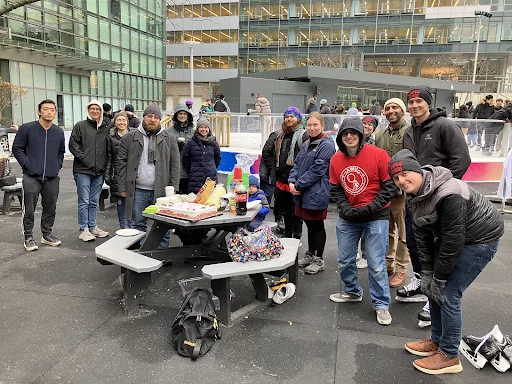
The Alphabet Workers Union (AWU), colloquially known as “the Google union,” just celebrated its three-year birthday and continues to demonstrate the opportunity of pre-majority worker organizing at megacorporations. You can read more about AWU in the new case study we just added to our pre-majority unionism report.
AWU emerged after several years of worker organizing among white- and blue-collar workers at Google, including petitions and a historic walkout, as well as some recognized unions, and alongside a burgeoning worker movement across the tech industry, typified by industry-wide Tech Workers Coalition. This lively history that preceded the only wall-to-wall union at a tech megacorporation demonstrates the great potential of the kind of organizing that EWOC does. An official union might be years away, but worker organizing can lay the institutional and — even more critically — cultural foundations. It’s hard to imagine AWU without the years of worker organizing that came before.
AWU is a wall-to-wall pre-majority union, meaning that our membership includes any worker at Alphabet (Google’s parent company), regardless of job title or employer. Indeed, many of our members are employed by third-party contracting agencies. On AWU’s structure, Chris Schmidt, former AWU secretary, says: “You need to have a formal structure that people can slot into, one to two to three to ten people at a time, with the idea of growing and connecting … our structure allows for that.”

AWU’s strategies and tactics have been diverse.
A town hall among data center workers that won a reinstitution of COVID hazard pay
A petition that won Raters millions of dollars per year in raises
A dramatic joint employment “wedding” demonstrating Google’s exploitative joint employment arrangement;
A majority strike threat that won Google Maps workers a work-from-home extension
Not to mention three majority recognition victories, unfair labor practice charges, and other legal tactics
As one might imagine, organizing 150,000 workers at a surveillance megacorporation has its challenges. Worker leaders with whom I spoke cited focus as a key challenge in the effort, as well as maintaining coherence within such a massive organizing effort. You can see some of AWU’s “union day” events, which function to maintain coherence and highlight efforts and victories within our union, on our YouTube channel.
Alphabet is of course fighting back. Most recently, Google cut an enormous swath of its search quality workforce after they had started to organize.
Want a more in-depth discussion of AWU’s history, structure, and strategy? Check out the case study! Want to know more about pre-majority union organizing in general? Have a look around the rest of the pre-majority unionism report!
Want to talk with a workplace organizer? Get in touch.
Ike McCreery is an organizer, researcher, and engineer. They chaired the organizing and steering committees of the Alphabet Workers Union and were a founding member of Tech Workers Coalition Seattle. They worked as a senior site reliability engineer at Google.
1 note
·
View note
Text
From Barboncino to Barbenheimer
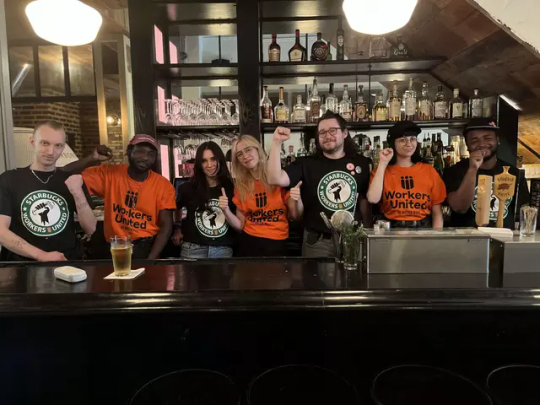
Meet an EWOC organizer who helped organize Barboncino and Nitehawk and moves at the “speed of trust.”
The Dam Breaks
In June 2022, a sewage pipe exploded in the basement of Barboncino Pizzeria in Brooklyn’s Crown Heights neighborhood. This caused a catastrophic flood within the restaurant in the middle of a busy service. Management forced workers to leave the floor upstairs in the dining area and start bailing out the sewage runoff. Workers had to vacuum and dispose of toilet paper, feminine hygiene products, and sewage water.
When they had finally cleaned up the toxic mess, they were covered in filth and expected their manager to let them go home. The owner of Barboncino told the manager that if workers went home, he would consider it “a mutinous act.”
And so, the workers walked off the job.
For Alex Dinndorf and his co-workers at Barboncino Pizzeria, this was the last straw. Alex’s roommate Mike was one of those workers responsible for bailing out the sewage. “I could smell it all the way from the second floor,” said Alex. He vividly remembers the stench from Mike’s clothing the minute he walked into the vestibule of their four-story apartment building.
From Twin Cities to NYC
Originally from the Minneapolis metro area, Alex is a veteran of the food service and restaurant industries. His first job at age 15 was at a McDonald’s. His first union job at age 17 was in a deli at Cub Foods, a large regional grocery chain in Minneapolis. Alex prepared food, carving and slicing meat — one of the “dirtier jobs” in the grocery store, which came with a membership in the United Food and Commercial Workers International Union (UFCW) local.
“I didn’t know anything about unions at the time,” said Alex. “I was just a kid, but I remember even as a high school student thinking that I made a little bit more than some of my friends made with this union job.”
At 18, Alex moved to New York City and worked in more restaurants there. He recalls that this was a turning point for him. “I lived with seven roommates in Crown Heights. My rent at the time was $800 a month and my wage in 2016 was $9 an hour. It was awful.”
Radicalizing on the Line
After years of working abysmal jobs in terrible kitchens as a line cook and a dishwasher, fast food and grocery stores, Alex declares, “I became politically radicalized working in places like this.” Intimately familiar with the raucous, chaotic, and at times dangerous working conditions that are emblematic of restaurants, Alex describes the kinds of working conditions that food services workers have had to endure.
“People are working with knives and they’re yelling at each other, swearing,” he said. “They get burned and hurt all the time. You’re working until 2:00 in the morning, and your boss might be drunk. There’s rampant abuse and misconduct and sexual harassment. Everyone who works in the food service industry, especially over many years, starts to see how unregulated it is. It’s like the Wild West.”
Barboncino was not unique. There were numerous examples of scheduling problems and unjust disciplinary treatment. “You say something that the manager doesn’t like, or you stand up for yourself, and you can get fired just like that,” he said.
There were also simple things that made working conditions intolerable over time. For example, when Barboncino was ridiculously low on forks for two months, bussers had to run down silverware constantly. Something like this would be an easy fix, but the owners were not interested in equipping their workers to operate efficiently.
An Historic Union at Barboncino
Until that infamous night, which Alex and his friends euphemistically dubbed “poop night,” workers at Barboncino had only casually thrown around the possibility of forming a union. Alex had been inspired by the Starbucks Workers United campaign of smaller unionized shops popping up all over the country during the pandemic.
“I started to think that maybe it’d be interesting if I worked at a unionized restaurant,” he said. Brendan, another Barboncino co-worker and close friend, had been involved with New York City DSA, which had connections with EWOC.
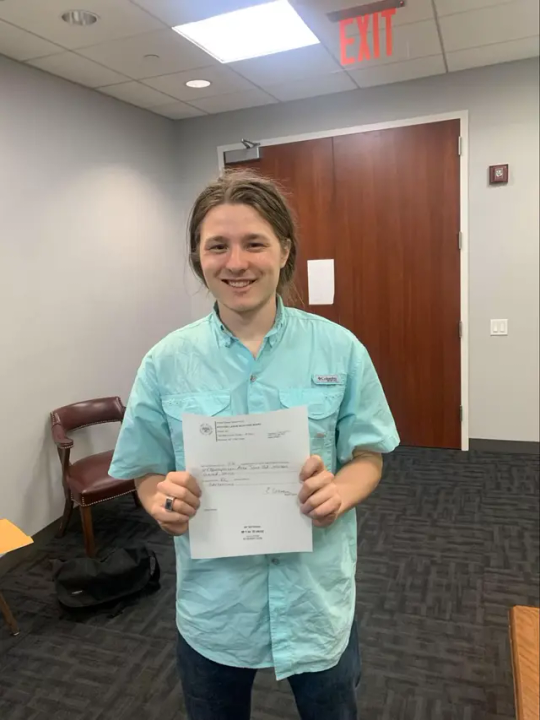
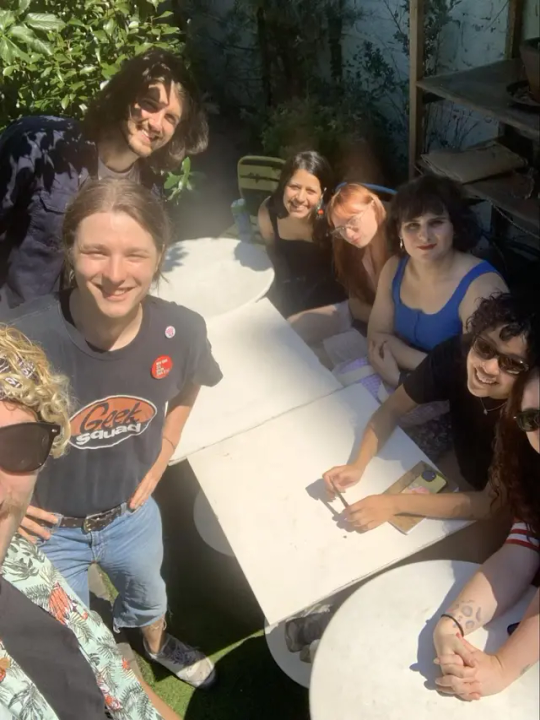
Working with EWOC
Brendan reached out to EWOC, who paired them with Andrew Stando, a veteran EWOC organizer. This was Alex’s introduction to the EWOC organizing model. Being educated and trained by Andrew as a worker, Alex learned practically what it meant to build a union and how realistic and approachable it was.
“Andrew was an incredibly dedicated EWOC representative,” said Alex. “He started going to our meetings and giving us counsel right away. He was very much a classic organizer, listening 75% of the time, speaking 25% of the time, and from there we started to learn how to organize.”
Andrew has become a close mentor and friend to Alex through this process. As for the rest of the workers at Barboncino, Alex reveals that getting them on board happened quite naturally.
“Once people understood what a union was, they wanted one,” he said. Alex and his co-workers educated themselves about their Weingarten rights and progressive ideas that could be incorporated in the contract. They learned that a contract could protect them from being over-scheduled, prevent sexual harassment, and provide a living wage. They reflected on what it could actually mean to have regular hours and strong disciplinary protections.
Winning the Barboncino Union
Barboncino Workers United won their election in July 2023, approximately one year and one month after that unforgettable night when their boss forced them to work in unsafe, unsanitary conditions and became the first unionized pizzeria in NYC. The experience of building a union with his best friends left Alex with a desire to get more seriously involved in the labor movement. Almost immediately, he joined EWOC as a volunteer organizer.
Alex had a vision to build Barboncino into this progressive idea of what a restaurant could be. Since it was the first unionized pizzeria in NYC, he wanted to create a blueprint to bring unions to all food and beverage workers one shop at a time.
In January, Alex attended the “Inside Organizer School” and met Richard Bensinger, who advised him that, “grandiosity is an excuse for laziness.” This left an impression on Alex. With those sobering words as a guide, Alex recognizes that organizing the service industry happens one shop at a time, worker to worker.
Follow Barboncino Workers United (@barboncionworkersunited) on X/Twitter and Instagram
The Barbenheimer Effect
The media buzz surrounding Barboncino Workers United during the summer of 2023 intrigued workers at Nitehawk Theater. They had just endured a difficult summer due to the popularity of ticket sales from “Barbenheimer,” wherein two blockbuster movies, “Barbie” and “Oppenheimer” were released as a double feature. The sudden flood of customer traffic brought to stark light the problems that had always been there of overscheduling, low pay, and unsafe working conditions.
Nitehawk is a dinner theater in Prospect Park that offers drinks and refreshments to customers while they enjoy a movie in a dark theater. The uniquely complex and challenging working conditions at Nitehawk were notorious in Brooklyn. The theater requires a variety of staff, from cooks to bartenders to food servers, to provide these concierge services. Food runners wear earpieces while discreetly navigating a network of weaving stairs, in and out of seven different theater screens within a 100 year-old building.
The owners at Nitehawk were ecstatic that Nitehawk Prospect Park was one of the highest grossing movie theaters in the country that summer. They convened a meeting with their staff to boast about their success with little acknowledgement of the hardships that workers faced.
After the workers at Nitehawk reached out, Alex supported their intake. He joined their earliest meetings and helped to connect them with UAW local 2179. There was a lesson to be learned about the difference between organizing his own workplace at Barboncino and organizing Nitehawk. Alex realized that once he was no longer a worker, he could not exert influence on the shop floor, where the organizing conversations were happening. “You can give workers advice, but at the end of the day, all the power in the shop comes from rank and file,” he said.
Follow the Nitehawk Workers Union (@nitehawkunion) on X/Twitter and Instagram
“Build strong, not fast”
Alex works closely with Will, who is the UAW representative, and expresses that it’s very much a partnership between EWOC and the UAW. Alex feels strongly that an incredibly dedicated volunteer organizer is what builds success in these campaigns. Just as Andrew Stando supported, trained, and modeled the type of dedicated EWOC volunteer organizer that Alex aspires to be, Alex finds fulfillment in doing the same.
“I go to every single organizing committee meeting,” he declares. “I’m in the group chats and supporting the workers anyway I can.” Alex often connects with the other food service workers who are organizing in NYC, even if they’re with different unions or brand workers. “A big part of the scene is just checking in and saying hi and making yourself available,” he said.
Alex encourages workers, “to build strong, not fast. A key lesson that I’ve learned is that organizing moves at the speed of trust. Everything is about relationships, asking for updates, and establishing rapport. And for people who want to organize service workers specifically, it’s important to be prompt, respond quickly to someone who needs help, and don’t be a stranger.”
Personal Growth
Being an EWOC volunteer organizer also has personal significance for Alex. “Working in these places my entire life,” he said, “being exploited and undermined, working at McDonald’s, working saute, as a fry cook, as a line cook, doing all of these laborious jobs for terrible wages, I felt like it was a chance to fight back.”
A graduate of Hunter College with a degree in english and political science, Alex had at one time considered becoming a librarian due to his love of books and reading. Today, he regards his vision for a powerful and growing labor movement as his labor of love.
“I always feel better after I do organizing work,” he said. “Even if I’m having a bad day, or if I want to just do nothing, I’ll send a useful e-mail or send somebody the right contact information or have a phone call, and I always feel better.”
Alex’s message to other food service workers: “There are so many reasons why you should organize!” Alex hopes to galvanize other workers in the food service and restaurant industries to unionize.
The Future of Organizing
“The Barboncino model, now the Nitehawk model, proves that you can unionize a restaurant and you could also unionize a giant in the restaurant industry,” he said. “Even if you don’t have organizing experience, and you feel like you can’t organize your own shop. Start with a base, think locally and contact EWOC support. If you’re looking for a job, there are plenty of campaigns that could use young, ambitious left-wing workers, just let me know!”
Thinking back on his own evolution, Alex counsels young people who feel black-pilled or fatalistic to become a part of a political project that they really believe in. “It’s a ton of work, and I’ve made sacrifices to put workers first,” he said. “But I love it. I wouldn’t want to do anything else.”
Workers United recently hired Alex Dinndorf as a part-time organizer. He is involved with campaigns in New York City and remotely around the country and still very much involved with organizing restaurant workers, including another restaurant campaign in Brooklyn.
If you’d like to connect with Alex, he can be reached at [email protected].
0 notes
Text
Union Domino Effect Reaches New Jersey Bookstore
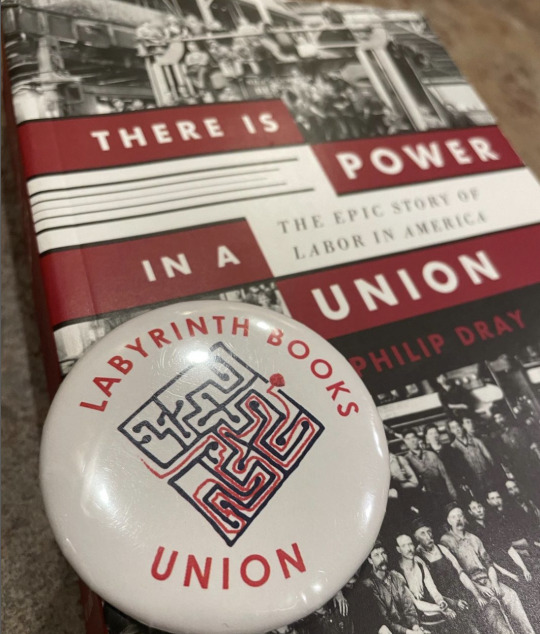
There was this desire to demand respect from our employers and see our work recognized as the labor that it is.”
One day in the summer of 2022, without announcement, explanation, or fanfare, a new notice appeared on the wall of the breakroom of Labyrinth Books in Princeton, New Jersey. Employees recognized it as the brand new union contract of Politics and Prose, D.C.’s first unionized bookstore, and it lit a fire.
“That was the initial call to action for all of us. After that a small group of people got together and started talking seriously about organizing,” recalls Sarah Kempf, one of Labyrinth Books’ organizers. They started by identifying their co-workers’ common complaints. “In this particular area of New Jersey, it’s just not a livable wage, and it’s a job that’s designed to be a long-term bookselling career.”
Though adequate pay was front of mind for Sarah and many of her coworkers, the notice on the wall sparked a drive within Labyrinth’s workers for a more intangible gain: the dignity they were owed. “Everything had been simmering under the surface for a while… There was this desire to demand respect from our employers and see our work recognized as the labor that it is.”
From grievances to action
The employee Discord server, already used as a space for workers to air their grievances, soon had a thread reserved for union discussion. The bar down the street had cheap drinks and lots of room, a perfect spot for organizers to commiserate with workers fresh off a difficult shift. Sarah remembers the invaluable solidarity built in these discussion zones. “You could stay there for an hour or however long you wanted but we would just sit around and talk. It was a great way to build community, to get people comfortable with colleagues that they don’t see or work with as much during the day. This played a huge role in our organizing. We created spaces both digitally and in person where people could come together and find community among their fellow workers.”
One of the organizers reached out to a contact at EWOC, and Sarah and other future members of the Labyrinth Books organizing committee (OC) wasted no time in attending trainings. “EWOC helped us set the foundation for the organizing committee,” Sarah says. “All of us who were on the OC did the EWOC foundational training together… It was a great way to see how other organizing campaigns were going, to get inspiration, to get questions answered. It was great to have a network of support from all around the country from people who were doing the same thing that we were.”
They contacted the Retail, Wholesale and Department Store Union (RWDSU) not long afterwards. “We knew that we wanted the support of a larger union … when we reached out to them, they were very excited because they had just been organizing the Rutgers Barnes & Noble… They were great in giving us the training that we needed and preparing us for anything we might face in the battle,” Sarah recalls. “RWDSU really wanted to ensure that as many people were inoculated and prepared as they could possibly be and it really paid off for us.”
Community support — and a major win
“Turnover was the most difficult challenge that we dealt with,” Sarah says. Like many other retail enterprises in college towns, Labyrinth’s workforce was constantly shifting, posing a serious threat to organizing attempts. The union effort nearly dissolved at one point after a large number of staff quit, but Sarah and her colleagues persevered.
“It was very demoralizing at first. It felt almost impossible to pick up the pieces after so many people had left,” she says. “What we learned was just how important it is to build a sense of community, to be the colleagues who are there for the new people, to be the first face that they see so they feel comfortable coming to us with their problems… Forming the union gave people a reason to stick around.”
When it was finally time for the campaign to go public, organizers found themselves buoyed by the power of Princeton’s community. This support came most immediately in the form of advice from Princeton faculty and graduate students, but Sarah thinks it had the remarkable effect of pressuring the store’s owners to voluntarily recognize the union as well.
January 9 saw the publishing of a press release declaring the owners’ intention “to use this organizing moment as an occasion to listen to everyone, make positive changes, and form a united Labyrinth that can do all the work we do better together.” Sarah attributes this surprising development to their community organizing efforts: “I think a lot of that had to do with the community support and how much they saw that the workers so overwhelmingly supported the union and how many people from the outside supported it as well… The community has really rallied behind us.”
The single act of pasting another union’s contract to the wall of the breakroom, carried out unprompted by an individual worker who left the bookstore shortly thereafter, set off an incredible wave of community-building that connected the booksellers at Labyrinth Books with Princeton community members, union organizers across the country, and most importantly each other. Through tenacity, resilience, and the enduring power of solidarity, this plucky group of Princeton organizers has secured for their colleagues all of the benefits afforded a unionized workplace.
Want to improve your workplace? Contact an EWOC organizer now!
26 notes
·
View notes
Text
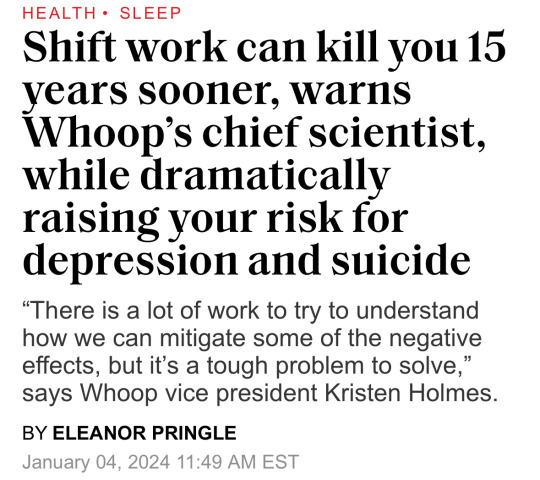
Source
Capitalism kills. Join a union to improve your working conditions.
3K notes
·
View notes
Text
Our Organizing Wins in 2023

Over the past year, EWOC had its busiest year yet with some truly extraordinary organizing wins. These include EWOC’s direct support in 14 successful union recognition wins and 15 more workplaces currently in a union drive. We’ve also connected 65 workplace campaigns and represented more than 7,000 workers to outside unions.
Growth in 2023
EWOC has also supported workers in
Taking one form of collective action at 447 workplaces
Winning demands at 47 pre-union workplaces
Marching on the boss at 17 workplaces
Striking at two workplaces
EWOC accomplished these wins by mobilizing our volunteers in 2023
200 EWOC volunteer organizers supported worker organizers
67 EWOC volunteers made worker intake calls, guaranteeing that every worker who reached out to us received a call within 48 hours
75 EWOC volunteers took on the role of support organizers. These are typically organizers with decades of experience, who mentor younger organizers working on EWOC campaigns.
Our 2023 Campaigns
These are some of the incredible stories from campaigns in 2023.
Residents at Beth-Israel Deaconess hospital in Boston ran a petition campaign with support from EWOC volunteers. That campaign garnered a supermajority of signatures in less than a week, and management conceded to the overwhelming pressure. They won a $10,000-per-year housing stipend and additional benefits for the 700 residents on staff.
Twenty-six workers at a Juiceland warehouse in Austin, Texas, won a $2-per-hour pay increase after marching on their boss.
Workers at The Basement, an escape room in Los Angeles, worked with EWOC volunteers to learn the foundations of organizing. They then went on to work with Actors Equity and become the first unionized escape room in the U.S.
In New York City, workers at Hex&Co., a gaming cafe, worked with EWOC volunteers for more than a year to develop organizing skills before connecting with a union. Their successful union drive with Workers United sparked a wave of game store union organizing across New York City. Two more stores have since announced union drives.
In Princeton, New Jersey, 19 workers at Labyrinth Books, an independent bookstore, are unionizing with the Retail, Wholesale and Department Store Union (RWDSU) after working with EWOC for over a year to develop their organizing skills.
Workers at Barboncino in Brooklyn worked with EWOC volunteers one-on-one over the course of many months. They learned and applied their organizing skills to become the first unionized pizzeria in New York City. Leaders from this campaign have even become organizing volunteers with EWOC. They use their experience and skills to support other service workers interested in organizing across the city.
2023 Special Events
In addition to EWOC’s organizing support, we had a record year of training. About 480 workers participated in our foundational training program. This four-week program runs six times a year at no cost to participants. We also put on two “Train the Trainers” events, growing from 10 to 55 foundational program facilitators. This has greatly helped expand our capacity to support workers interested in our training.
In 2023, EWOC launched a fellowship program designed as a follow-up to the foundational training, specifically for workers engaged in ongoing workplace campaigns. Participants were invited to apply with their co-workers. We welcomed 49 participants split into four cohort sessions, each lasting six weeks.
EWOC also put on a number of events in 2023. We discussed many labor topics, including salting, corporate research and power mapping, the Cemex decision, and organizing in remote workplaces. Jane MacAlevey joined EWOC for training on winning a first contract, and members of UAWD and TDU came to speak about the power of strikes and contract campaigns. Adam Conover attended an EWOC volunteer call and gave us a shout-out on his show.
In 2023, EWOC released a 26-part video series entitled “Unionizing 101.” These short videos were designed to make unionizing accessible and fun. They broke down core organizing questions like leader identification, power mapping, and more! These videos have more than 6,000 views on YouTube alone.
9 notes
·
View notes
Text
“More than 460,000 workers took part in work stoppages in 2023 alone.”
1 note
·
View note
Text
All It Takes Is One: How an Injury on the Job Spurred Organizing Efforts at FedEx

by Natascha Elena Uhlmann
FedEx workers had enough of impossible workloads and understaffing — so they organized.
Injured on the job
Jeremiah Davila, a retail employee (known internally as a store consultant) at FedEx Office, tried to reason with management about unreasonable workloads and understaffing. He saw co-workers transfer and quit and knew that the vacancies wouldn’t be filled unless pay and working conditions improved. Though some might imagine FedEx office as a laid-back work environment, the work is specialized and taxing: workers unload, package, and transport heavy parcels while balancing additional retail and production duties. For Jeremiah, the breaking point came when he was injured on the job — and management, he says, was nonchalant. Done with waiting on empty promises, he took to organizing.
“I had been warning them for a while [about] these working conditions … [saying] we can’t keep working like this. If someone calls in sick, you can push yourself a little for a day, but you can’t keep going like that for a month,” he notes. “So I’d been warning them for a while, and they just were kind of like, ‘Yeah, yeah, we’ll take care of you,’ was the response, but nothing ever got done. Just a lot of empty promises … When I told them about the injury, they just seemed more skeptical than anything else.”
Unsustainable workloads
He wasn’t alone. Jeremiah’s co-worker, Genesis, had also seen the company promise to improve working conditions then fail to deliver. At their flagship store — one of the busiest in the district — workers juggled packing, shipping, printing, laminating, and retail duties, with critically low levels of staffing. Over time, their team of four dwindled to two, with no new hires in sight. Instead, management turned to a band-aid solution:
“As far as I can tell, our entire district is short-staffed. They like to play this game where they bounce people round from store to store, to cover the short staffing. But the reality is they have a store that’s really understaffed and then they pull people from a marginally less understaffed store. What the reality is, whatever the magic number is for the district … no matter how much you’re bouncing them around they’re all doing the work of more than one person,” says Jeremiah.
“We did a little digging to find out about the managerial compensation. I don’t know the exact numbers, but as far as the store manager on up, if there is a budgetary surplus, they do receive a bonus, a percentage of it. Not illegal, but obviously very unethical and a clear motivator, borderline conflict of interest,” he adds.
Learning the ropes
Jeremiah and Genesis had never participated in workplace actions, but they learned as they went. They went out on strike, demanding an end to understaffing, compensation for the specialized nature of their work, and safe workloads — so no one is injured again. “It’s been very bootstraps guerilla from the start, but that’s kind of our style,” says Jeremiah. After a supervisor allegedly made social media comments stating workers would be retaliated against for their organizing, they filed charges with the National Labor Relations Board (NLRB). Management was quick to respond.
“Once we filed those charges, there was a huge change in the communication with management — massive change. A lot more toned down, respectful, actually taking seriously what we were saying about our boundaries, about, ‘Hey, we’re trying to negotiate here, collective bargaining, yeah, we’re not a recognized union, but we still have protection to collectively bargain nonetheless,’” says Jeremiah.
When we fight, we win
Taking action with your co-workers can be nerve wracking, but Genesis and Jeremiah looked to other worker victories for resolve. “Genesis and I were on the fence were on striking. We were actually talking about the UPS strike, and I was like, if they did it, anyone can do it … If they hadn’t done that, I don’t think we would have followed through with what we’re doing,” he says.
Fortunately, they’re not alone. Workers across the country have seen historic raises and improvements to working conditions at UPS, Ford, GM, and Stellantis — all of which were won by workers being prepared to fight for each other. If you’re curious about organizing your own workplace, Jeremiah has advice: “The NLRB is a great starting point, they have all the forms. But it’s really confusing, and I’m not gonna lie, I had to have a few tries to get my stuff right. So an organization like EWOC is what I would also recommend — where people have been through the process and they can help you if you have questions … people who have done it before are gonna be the best people who can help.”
Want to improve your workplace? Contact an EWOC organizer now!
This interview has been edited for length and clarity.
19 notes
·
View notes
Text
Want to know more about the Cemex decision and what it means for you at work? 👇
23 notes
·
View notes
Text
🚨Fundraising Alert🚨
Support Durham Workers Out of Work in Protest of Low Pay!
Durham sanitation workers are standing down, currently on their 3rd day out of work! These workers are standing up for all workers across the city, state, and country!
This fundraiser is to help cover the salaries of those workers that did not have sick or vacation time they could use to cover those days off work. There are several temporary workers that have no sick or vacation time, that took the stand.
There are new employees and others with chronic health conditions that also do not have leave time. These workers stood up for us, now we must stand with them!
12 notes
·
View notes
Text

There's still time to register for EWOC's fundamental training series!
We'll show you everything you need to know about starting a union campaign in your workplace in just four sessions, starting tomorrow 👀 at 1 p.m. ET.
Register:
2 notes
·
View notes
Text
Organizers 📈📈📈
More than 65 new volunteers have signed up to join EWOC in the last two months. 💪
With a surge in workers reaching out, we've also seen a sharp increase in volunteers.
And we need you: organizers 📋, writers ✍️, analysts 📈, designers 🎨, anyone 🙋.
Let's get started:
4 notes
·
View notes